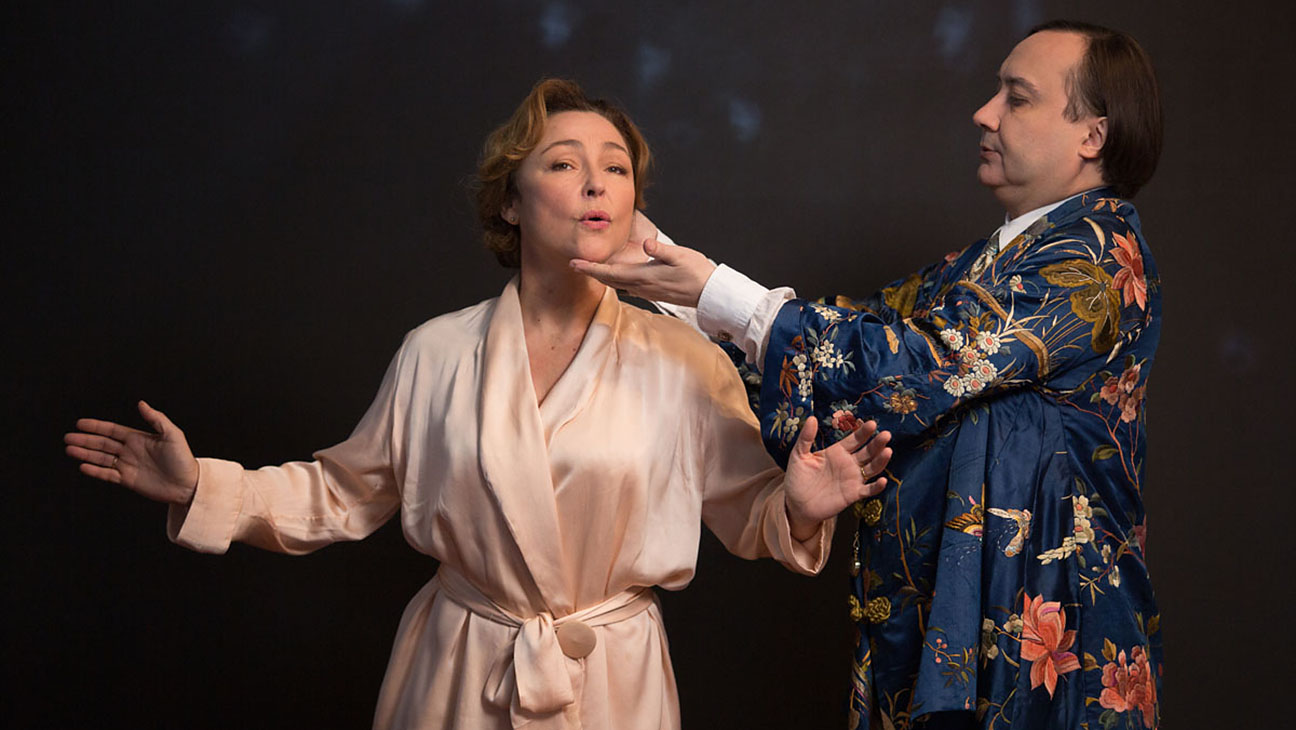MARGUERITE
Cohen Media Group
Reviewed by: Harvey Karten for Shockya, d-based on Rotten Tomatoes
Grade: A-
Director: Xavier Giannoli
Written by: Xavier Giannoli, Marcia Romano
Cast: Catherine Frot, André Marcon, Michel Fau, Christa Théret, Denis Mpunga, Sylvain Dieuaide, Aubert Fenoy, Sophie Leboutte, Theo Cholbi
Screened at: Review 2, NYC, 3/3/16
Opens: March 11, 2016
I’ll bet you like to sing in the shower? Why? Because you sound terrific. You have fallen in love with your own voice. That’s because singers don’t really hear their own voices as others hear them. Nowadays it’s easy to record yourself, and a quick chorus in front of a Sony ICDPX333 voice recorder would quickly set you straight. Don’t give up your day job. But in 1921, while recorders did exist, they were not used too frequently, nor would the family and servants of a woman as rich as The Donald want to spill the news, to tell the truth. The woman of the house, a baroness named Marguerite Dumont (Catherine Frot), lives for opera and her husband, Georges Dumont (André Marcon), thinks that if she knew the truth, that would kill her. Marguerite married Georges not for himself but for his title, that of baron. Georges married Marguerite for her money. The servants all know that they have good jobs, particularly Marguerite’s butler Madelbos (Denis Mpunga) and they also know that their lady’s voice makes them wear earplugs—literally, as the butler passes them out whenever the title character sings. Nobody lets on.
Xavier Giannoli, who directs and co-wrote “Marguerite,” is well qualified having directed “The Singer,” known by the French title as Quand j’étais chanteur, which deals with one Alain Moreau, the idol of a female audience, who is aware that with his advancing years the audience and his voice are diminishing. Marguerite will eventually face a similar dilemma. The story is loosely inspired by the life of Florence Foster Jenkins, an American socialite known and ridiculed for her lack of rhythm, pitch, and tone. Stephen Frears’ biopic about Jenkins is in the works now, starring Meryl Streep, but one wonders whether Hollywood will kill the quality of this magnificent French offering. The music, which includes works by Handel and Mozart, is probably the best you’ll hear this year, well treated by the high fidelity systems of the multiplex. One of the singers, played by Christa Theret who appears in a duet for charity at the Dumont mansion, is terrific, but her spell disappears as soon as Marguerite sings her favorite aria, Mozart’s “Queen of the Night” from “The Magic Flute,” failing to hit the high notes and for that matter the other notes as well. The audience hold back their laughter since, after all, the concert is for a good cause.
Much is made about Marguerite’s major motivation, which is to gain the pride and affection of her husband, but Georges, while supporting the farce along with his wife’s sycophant friends, is so unable to lie to her that he deliberately stalls his own car on the way back to the house to avoid the humiliation of hearing his wife’s singing. Keeping the joke running, a fun-loving journalist, Lucien Beaumont (Sylvain Dieuaide), writes a rave review in his newspaper, harboring a plan to become part of Marguerite’s inner circle, while the butler regularly cuts out and destroys all the honest reviews.
What makes this movie soar is its ability to make us in the audience not simply laugh at Marguerite but to feel pathos for her as well. Even Atos Pezzini (Michel Fau), a has-been operatic star who sings a chorus from “Pagliacci” in the film and serves as Marguerite’s teacher, feels bad about the woman but is blackmailed into the role of training the voice of a woman who is simply hopeless.
The movie, which won eleven César Award Nominations was filmed in the Czech Republic, costumes coming from the Barrandov Studio Prague’s ‘burbs (see my article about the Barrandov in the Film Journal at http://www.filmjournal.com/barrandov-back-lot). “Marguerite” serves us well when we consider the epilogue, which brings everything to a climactic finale, when we in the audience must guess and discuss with one another whether the revealed truth allows her to get on with her life more realistically or destroys her. Bravo!
Unrated. 127 minutes. © Harvey Karten, Member, New York Film Critics Online
Story – A-
Acting – A
Technical – A-
Overall – A-

